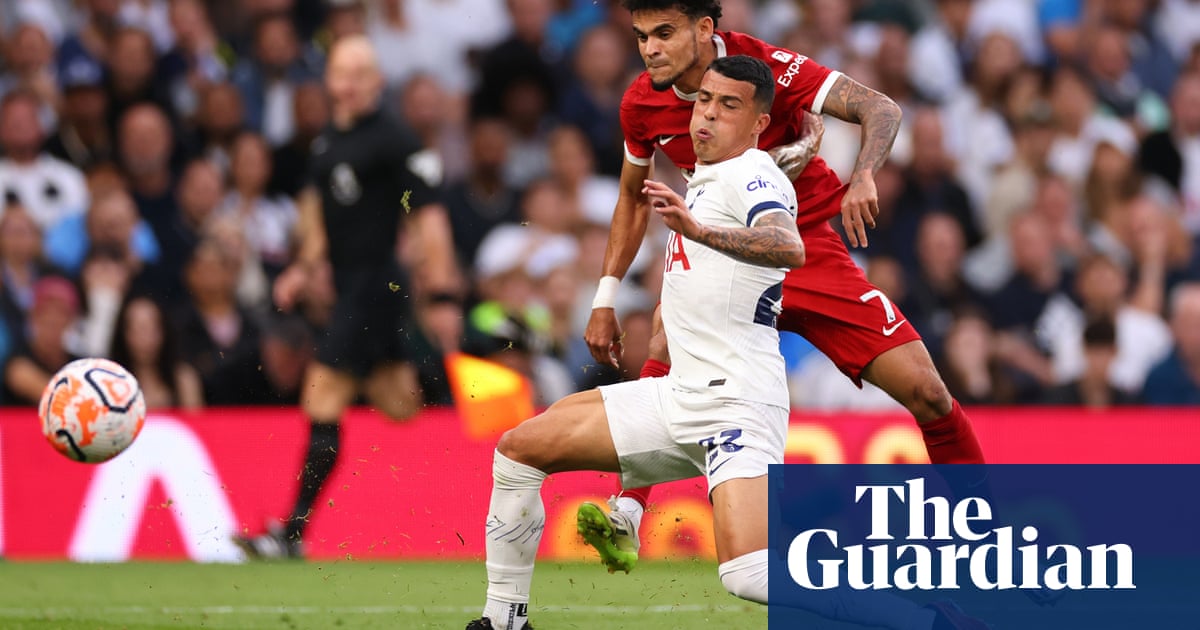
“Release the tapes” was the call around the world. The Professional Game Match Officials Limited Stockley Park basement tapes proved to be less Richard Nixon than the sound of confusion, resembling a group of middle-aged novices attempting to play World of Warcraft.
As anatomies of disaster goes, the ruling out of Luis Díaz’s goal at Tottenham turned out to be a case of incompetence rather than deep-state conspiracy. The heroes of the hour are revealed to be the on-site replay operator Mo Abby, first to spot the problem, and Oli Kohout, the VAR Hub operations executive, who, off-mic, urges the delay of the match. Already though, the names of the VAR, Darren England, and assistant VAR, Dan Cook, are hurtling towards infamy. And neither Abby nor Kohout are members of Howard Webb’s select band of officials deemed exclusively capable of operating VAR in the Premier League, from whom there have been 14 apologies since the beginning of last season.
If there is a benefit to be gained from England and Cook taking their eye off a pixelated ball, it is to show that on-field refereeing expertise is little guarantee of excellence in sweeping up mistakes made on the pitch when viewing them in UHD. Perhaps computer whiz-kids, esports specialists, those of greater hand-eye coordination and grey-matter twitch fibres, with a firmer grasp on technology, are VAR’s best foot forward. Webb himself lamented in May that “we’re not able to go outside of the refereeing fraternity to employ VAR”.
Before being stood down, England was supposed to be fourth official for Nottingham Forest’s 1-1 draw with Brentford the following lunchtime and Cook expected to run the line as Fulham played Chelsea at Craven Cottage. Are refereeing resources spread too thinly, officials asked to multitask beyond their skillset? Within the Premier League statement to accompany the transcript and video was an admission that “work is ongoing to create a dedicated pool of VAR specialists”.
The two minutes and nine seconds video released goes little way to satisfying those associated with Liverpool nor those who see VAR as a Pandora’s box wreaking severe damage to the spectacle of football. It ends in pathos. “I can’t do anything, I can’t do anything,” mutters England, before his bleeped-out swear word introduces the fade-out.
Just before that, the confusion has descended to such a level that Michael Oliver, the fourth official, speaks quizzically for the first time, confused that the calls for “Oli” are for him and not Kohout. Previous glimpses under the VAR bonnet have revealed the matey use of nicknames between these usually balding men from the north, itself something of a reflection of the lack of diversity within football officialdom. “That’s wrong that, Daz,” laments Cook, to England. Not that recruiting anyone to work in this sphere will be made any easier by the vilification that followed Saturday night at the Tottenham Hotspur Stadium.
Working in VAR sounds complicated, pressurised, thankless. It has also made the actual referee’s job even harder. So many plates to spin. The Díaz video begins with the frantic headset discourse between a referee and his assistants that happen within every match. “Both holding,” says the breathy first assistant, Adrian Holmes, his and the referee Simon Hooper’s voices heavy with the effort of keeping up with Premier League players of Olympian speed. “Waiting … waiting … delaying,” announces Holmes after Mohammed Salah releases Díaz, as if to remind himself not to wave his flag until the sequence of play has finished.
“Give it,” says Simon Long, the second referee’s assistant, as Díaz nets. But what is “it”? A goal or an offside? Here the chaos begins. England, the VAR, perhaps not so fresh off his trip to the UAE, takes up the cudgels.
“Kick point, please,” England says, businesslike in issuing instructions to Abby. “Give me 2D line ready after this one for frame two after that.” It sounds like the type of terse exchange overheard in air-traffic control. After Abby produces the lines to show Díaz is being played onside by Cristian Romero’s boot, England and Hooper celebrate their job well done, another bullet dodged.
England: “Check complete, check complete. That’s fine, perfect.”
Hooper: “Cheers mate.”
England: “Thank you mate.”
Hooper: “Well done boys, good process.”
It has been no such thing. It is left to Abby and Kohout to tell England and Cook where they’ve gone wrong. “Yeah,” says Cook when an incredulous Abby asks if he is happy with what is happening. By now, Tottenham have restarted the game, and quickly, too. Their players sense they have got away with something.
Not shown on the PGMOL release, but visible elsewhere, is the moment that Hooper’s earpiece informs him of the mistake, his face ashen. Again, Abby and Kohout have been the adults in the room, advising England to stop the game, to restart. On the field, nothing major has happened. Stopping the game now, awarding the goal would be the only practical, sensible course of action.
Instead, “we can’t do anything, we can’t do anything” is a lament to highlight that even if something should be done, VAR’s hold over the game’s officials extends to the removal of rational thinking.












